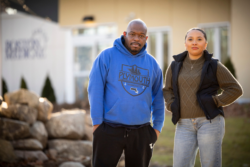Greg has never been afraid of hard work. He got his first job at age 16 and has had countless jobs since then. Another habit picked up at a young age—drinking. What began as a drink with a friend at age 12 became something different when, a few years later, Greg needed a few beers to calm his nerves before a 7 a.m. job interview.
“It seemed to happen overnight,” Greg says. “I don’t even remember all the good times I had when I was drinking. It’s so much more negative than positive.” His battle with addiction has spanned more than two decades; yet, he refuses to give up on himself. It’s how he found himself at BMC’s Brockton Behavioral Health Center. “This is my opportunity to get it right,” he says.
BMC’s Brockton Behavioral Health Center opened its doors last October in response to an alarming unmet need across Massachusetts for accessible, affordable behavioral health care, particularly for individuals living in low-income communities. Nearly 50% of MassHealth patients have mental health needs, and for the majority, those needs go hand in hand with a substance use disorder—a combination that’s difficult and expensive to treat. Too often, unable to get the care they need, patients turn to emergency departments (ED). Since the start of the pandemic, ED visits related to co-occurring disorders have increased 53%, and only half of these patients are placed in long-term substance use disorder recovery programs after they are discharged—an outcome of too few dual diagnosis programs in Massachusetts and too many staff shortages and budget cuts. Historically, care has been limited to those who can afford it.

Since opening, the Center has provided compassionate care to 253 Boston-area residents experiencing mental health and substance use disorders, 70% of whom were government insured. This state-of-the-art, 82-bed facility provides a range of services to patients in two inpatient psychiatric units for acute psychiatric treatment and detoxification and a clinical stabilization service unit, which provides residential treatment for long-term recovery from substance use disorder.
Although Black Americans have rates of mental illness in line with the rest of the U.S. population, only 2% of the psychiatrists identify as Black. BMC recognizes the effectiveness of care delivered by providers who resemble their patients, which is why 62% of the Brockton Behavioral Health Center’s 140 fair-wage jobs are filled with diverse Brockton-area residents who bring cultural competency, sensitivity to trauma, and humility to their work. Staff speak Spanish, Cape Verdean, Haitian Creole and more; they look and sound like the patients they’re serving.
Jelena Dansby, one of Greg’s recovery specialists, is a Brockton local whose own journey with addiction fueled her desire to help people in her community who are struggling with substance use disorders. At the Brockton Center, Dansby’s time is spent with patients like Greg, listening to them, observing their moods, and giving them whatever support they need in the moment to meet their recovery goals.
The Center is also unique in its delivery of a comprehensive care model. By coordinating with patients’ care providers outside of the Center, offering pharmacy services onsite, and putting discharge plans in place to set patients up for success upon leaving the Center, staff eliminate the hurdles that can impede recovery. This is a game-changer for many patients, who attest that no prior program has provided the support for self-reflection and allowed them to identify what will motivate them to succeed.
Patients’ humanity and dignity inspire every component of care and drove every aspect of the Center’s design. With mindfulness meditation, yoga and Reiki; music and art therapy; an outdoor basketball court and garden; chaplaincy services; and more, it’s clear the Brockton facility is a major investment in the health of a predominantly underinvested in and racially diverse patient community.
“I’m proud of this building, this level of financial investment in a community as diverse at Brockton,” says Tracey Weeden, executive director of the Center. “This doesn’t typically happen in Black and Brown communities.”
Thanks to a generous $6 million philanthropic gift, the Brockton Center is also the first carbon-neutral behavioral health facility in the United States, marking a significant addition to BMC’s sustainability efforts and commitment to combating climate change. The site uses geothermal heating and runs off renewable, sustainable energy; it’s a model for facilities everywhere. The green initiative, like its focus on a multiculturally competent staff and its commitment to assisting those who are unable to pay for treatment, is not an outcome of building the Brockton Behavioral Health Center, it was the purpose.
Greg is feeling confident about his future, and he attributes this to the staff, like Dansby, who have been willing to do any and everything within their power to support him on his journey. He is eager to get back to work in construction and back to his family.
“This place is providing me with everything I need to put my best foot forward,” Greg says.
Both Greg and Dansby reflect on their recovery, noting the importance of having someone who’s been through it—who is willing to jump down into the “hole” with you and show you the way out. Greg wants to do the same for others like him.
“With continued sobriety and continued recovery, I’ll be able to give back… ,” Greg says, “explain my story, and let others know ‘I’ve been where you’ve been. I understand exactly what you’re going through. I know the way; follow me.’”